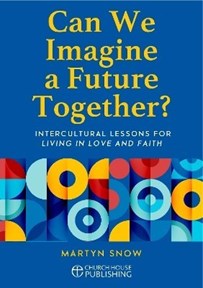A SENIOR lawyer proudly told me that he was giving an after-dinner speech at his livery company on “Philanthropy”. When I asked whether he would be speaking for or against, he was totally bemused. Martyn Snow, writing out of his experience in ex-colonial West Africa and now as Bishop of multi-cultural Leicester, seeks a sense of giving much deeper than being charitable to those who are different from us. He calls for “radical receptivity”. As we negotiate the way through our far less homogeneous society, as we encounter new people and different cultures, he sees diversity itself as a gift. The way forward is neither assimilation nor multi-culturalism, but an intercultural society and an intercultural Church, within which we all have gifts to share and exchange.
This is difficult for a country and a Church steeped in colonialism, where some even try to relativise such evils as slavery. Can we de-centre ourselves and move away from white normativity? Within the complex dynamics when cultures meet, there is always the issue of power. He gives the telling example of how we apply the labels “expat” and “immigrant”. He also argues, contrary to what many of us were preaching on Whit Sunday, that Babel was the work of colonisers, but Pentecost sanctifies difference.
Encountering people from a different culture can be exciting, but also disturbing. Is everything now negotiable? That is a particular issue within inter-cultural theology. Snow draws on Lesslie Newbigin, that cultural humility is not relativism, and even more on Alasdair MacIntyre, that Tradition is an ongoing debate about truth: while law is necessary, it is even more important to cultivate the virtues. He roots it all in the generous self-giving of God, celebrated in the transformative act of thanksgiving which is the eucharist.

His fellow bishop in Leicester, Saju Muthalaly, provides an interlude in the book about the gift of hospitality: we welcome others, because we see in them the image of God, and we are driven by grace, which may be even more important than what liberation theology taught us about justice.
In the accompanying booklet, Snow applies these same principles of gift exchange to his other and very sensitive role (which he has just relinquished), as lead bishop for the Living in Love and Faith process. He admits that there is no direct equivalence with all the multi-cultural questions, but they share some of the essential issues. How do we see the “other”: as someone different from us, or as a person who is also made in the image of God? Are we ready only to give, or even demand, or are we prepared also to receive? What is normative: that which we have inherited and with which we feel comfortable, or where (as when Peter met Cornelius) God may be calling us into something new?
Snow, from a somewhat traditionalist position, is calling for a season of discernment durng which might be practised those same principles of generous giving, radical receptiveness, and transformative thanksgiving. We can only pray that, as with the wider multi-cultural debate and its overhanging colonialism, the deciding factor will not be who has the power, but how we stay close to the generous self-giving of God.
The Rt Revd Michael Doe is an honorary assistant bishop in the diocese of Southwark.
An Intercultural Church for a Multicultural World: Reflections on gift exchange
Martyn Snow, editor
Church House Publishing £16.99
(978-1-78140-472-0)
Church Times Bookshop £15.29
Can We Imagine a Future Together? Intercultural lessons for Living in Love and Faith
Martyn Snow
Church House Publishing £4.99
(978-1-78140-513-0)
Church Times Bookshop £4.49
















